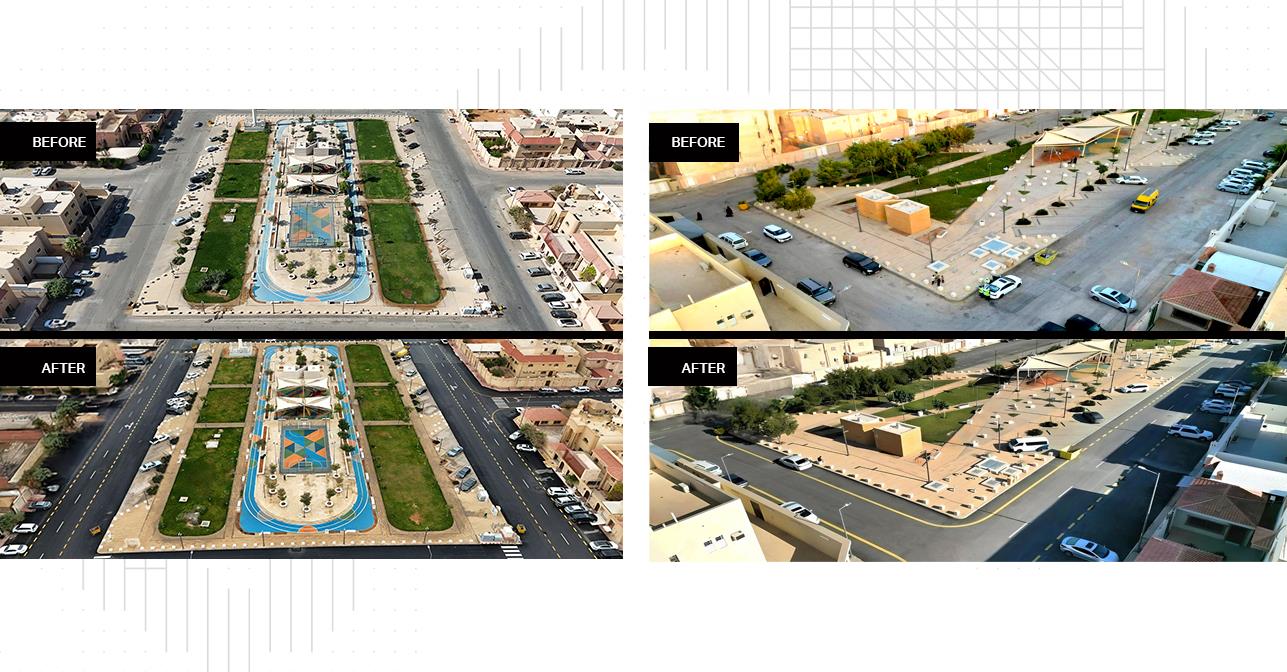
Location
Riyadh, Kingdom of Saudi Arabia, Middle East
Overview
Facilities management for the road network in Riyadh City, covering over 83 million m2 of roadway infrastructure.
Riyadh, the capital city of the Kingdom of Saudi Arabia, is undergoing a transformative period as part of the nation's Vision 2030 initiative. This ambitious vision aims to diversify the economy, enhance quality of life, and position Riyadh as a global economic and cultural hub. A key component of this vision is the development of world-class infrastructure to support sustainable urban growth and improve the daily lives of residents and visitors.
To align with that vision and position Riyadh to accommodate ever greater growth, the Riyadh Region Municipality launched a 60-month programme, aimed at upgrading the road and transportation networks in Riyadh, achieving a higher standard of road quality and enhancing traffic safety across the city. Dar was commissioned as a facilities management consultant to lead this critical endeavour. Dar implemented a comprehensive set of safety, quality, and cost-efficiency interventions across more than 83 million m² of roadway infrastructure – driving engineering excellence, urban mobility, and long-term sustainability aligned with Vision 2030.
Upgrading and enhancing over 83 million m2 of road area
Divided into five distinct geographic packages—North, South, West, East, and Central— and covering 83 million m2 of road area, this project is a pivotal step towards modernising Riyadh's infrastructure, ensuring smoother, safer, and more efficient transportation across the Saudi capital.
As the facilities management consultant till end of May 2025, Dar assessed 1200 locations and implemented targeted improvements at 995 sites – all aimed at improving road infrastructure, bolstering traffic safety, and implementing cutting-edge road maintenance practices. Twenty-nine high-risk areas have already received critical upgrades, with 64 more scheduled. These initiatives included:
- Enhancing RI/RO configurations, sidewalks, kerbstones, raised crossings, and traffic calming devices.
- Delivering surface and drainage improvements, to enhance safety and durability.
- Introducing advanced pedestrian infrastructure
- Introducing a road marking durability initiative, tailored to Riyadh’s climate, with innovative marking materials being field-tested to improve long-term visibility and reduce the frequency of required maintenance.
- Redesigning intersections: Modifying key intersections to reduce congestion and accidents, improving traffic flow and safety for all road users.
- Managing ongoing maintenance projects: Overseeing a series of ongoing maintenance efforts across the city to enhance road longevity and condition.
- Upgrading footpaths and road barriers: Ensuring pedestrian safety and reinforcing road boundaries for better traffic control.
- Providing road painting and signage: Marking road lines, improving visibility, and updating traffic signs for clearer guidance.
- Implementing international best practices: Implementing global standards in road maintenance and safety to elevate Riyadh's infrastructure to world-class levels.
Within the project, Dar conducted a thorough review and assessment of over 1,000 technical submittals and existing road drawings and plans (including over 400 dedicated to signage and markings) to ensure accuracy and the effective application of upgrades. Based on these reviews, new design guidelines were issued to contractors, integrating critical safety standards and improving review efficiency. Our experts also supervised laboratory tests to guarantee the quality of required materials, ensuring their durability and performance throughout the project.
Initial results showed a significant reduction in user complaints as well as improved flow across redesigned intersections, while ride quality and visual inspections indicate smoother and safer roads.
Optimising costs
For such an ambitious public infrastructure improvement programme, it was essential to optimise costs and spending to ensure that Riyadh communities could obtain the maximum value. Dar implemented cost optimisation strategies during the road maintenance phase, particularly in milling and resurfacing operations, focusing on precise elevation assessments to minimise asphalt removal and reapplication. Key measures included:
- Optimising surface elevations and stormwater flow lines to reduce milling depth and resurfacing quantities.
- Limiting resurfacing scope on intersecting roads and extending work only to areas showing clear signs of deterioration or hydraulic inefficiency.
- Performing selective treatment of parking areas with poor drainage performance to avoid unnecessary resurfacing in stable zones.
Moreover, the team revised road marking requirements in narrow residential streets, applying markings only were essential. These adjustments helped:
- Reduce materials and labour costs without compromising functionality or safety.
- Maintain surface continuity and water flow efficiency.
All quantities were monitored through daily contractor submissions and visualized on a GIS-enabled dashboard, enabling real-time cost tracking and early identification of cost deviations.
Establishing electronic systems to automate and archive maintenance reporting
To enhance operational efficiency, Dar’s digital experts established an advanced electronic system to automate and archive maintenance reports, reducing manual workload. Introducing this automated system to handle reporting and documentation will improve time management, reduce manual errors, and create a comprehensive archive for future reference. The system reduced review time by over 50%, eliminated printing costs, improved collaboration, and provided real-time data for better cost control and decision-making.
Enhanced road infrastructure, for one of the world’s most ambitious cities
The program represents a landmark initiative for Riyadh, driving the city’s journey towards modernisation and smart infrastructure. By improving road conditions, incorporating international safety practices, and introducing advanced technology, the program will significantly elevate Riyadh’s urban environment, creating a safer, more efficient transportation network for its residents and visitors alike.
Services
Markets
